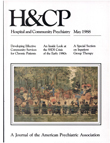A Systems Model of Short-Term, Open-Ended Group Therapy
Abstract
Because of rapid patient turnover and periodic therapist rotations, inpatient psychotherapy groups with open membership can sometimes appear to beforever beginning or forever ending. Described here is a model of group process that identifies four distinct stages of group development experienced by open-ended groups. Each of the four stages—called rebeginning, subgrouping, work phase, and termination—is characterized by attention to a particular boundary issue. In stages 1 to 3, the group members gradually move from establishing the group's separateness from other hospital systems to establishing alliances with the therapist and with each other to developing mutually supportive relationships. When several members are discharged, the group enters stage 4, during which it renews its efforts to fortify its external boundary. Therapeutic interven- tions appropriate to each stage of group development are discussed.
Access content
To read the fulltext, please use one of the options below to sign in or purchase access.- Personal login
- Institutional Login
- Sign in via OpenAthens
- Register for access
-
Please login/register if you wish to pair your device and check access availability.
Not a subscriber?
PsychiatryOnline subscription options offer access to the DSM-5 library, books, journals, CME, and patient resources. This all-in-one virtual library provides psychiatrists and mental health professionals with key resources for diagnosis, treatment, research, and professional development.
Need more help? PsychiatryOnline Customer Service may be reached by emailing [email protected] or by calling 800-368-5777 (in the U.S.) or 703-907-7322 (outside the U.S.).



